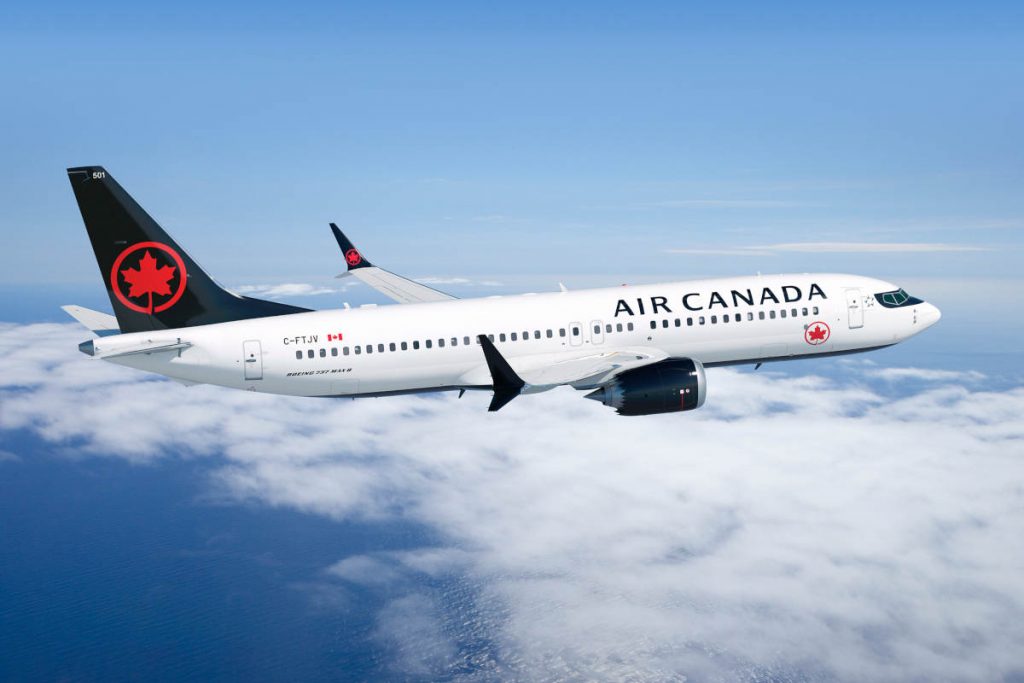
Features
Airlines
Air Canada reaches new deal to purchase Transat A.T.
October 11, 2020 By Wings Staff
 Air Canada Boeing 737 MAX. (Photo: Air Canada)
Air Canada Boeing 737 MAX. (Photo: Air Canada) Air Canada and Transat A.T. agreed on a new transaction agreement, including what Canada’s flag carrier describes as a purchase price reflecting the impact of Covid-19 on airline values. At $5.00 per Transat A.T. share, the new purchase price is approximately 72 per cent lower than $18.00 per-share price agreed to back in June 2019.
Air Canada notes, however, that the new $5.00 per-share price represents a premium of 31.6 per cent over the 20-day volume weighted average price of Transat shares on October 8, 2020. The transaction will proceed through a court-approved plan of arrangement under the Canada Business Corporations Act. In a statement about the new agreement, Transat announced it had undertaken a $250 million short-term loan on October 10.
In May 2019, when the deal for Air Canada to buy Transat A.T. was first announced, the initial purchase price was $13.00 per share, a value of approximately $520 million. By mid-June 2019, however, objections by some large Transat shareholders and the introduction of a potential new Transat suitor had pushed the price from $13 to $18 per share, bringing the value of the proposed all-cash transaction to approximately $720 million.
Air Canada increases purchase price for Transat
Under the new agreement announced on October 10, Air Canada, based on a fixed exchange ratio and price of $5.00 for all issued and outstanding shares, is now moving to acquire Transat for approximately $190 million. This overall price reduction from $720 million to $190 million equates to a decrease of close to 73.6 per cent, as opposed to the 72.2 per cent price drop based only on share price values.
“COVID-19 has had a devastating effect on the global airline industry… Nonetheless, Air Canada intends to complete its acquisition of Transat, at a reduced price and on modified terms,” said Calin Rovinescu, president and CEO of Air Canada.
On October 8, 2020, two days before the new deal with Transat was made public, Air Canada announced it had generated $485 million (US$365 million) in proceeds from the sale of nine Boeing 737 MAX 8 aircraft in leaseback transactions with Jackson Square Aviation and Avolon Aerospace Leasing Limited. The nine aircraft were delivered to Air Canada over the past three years.
Air Canada sells nine 737 MAX 8 under leaseback transactions
The new Transat transaction announced on October 10, 2020 – expected to be completed in late January or early February 2021 – remains subject to shareholder approval, court approval, and customary regulatory approvals, as well as some conditions. This includes a new closing condition that Transat’s level of net indebtedness on closing not exceed a specified threshold.
“With the volume now forecasted to be down 66 per cent worldwide at the end of 2020, it is clear that the world has changed since the signing of the original agreement in June 2019,” said Jean-Marc Eustache, president and CEO of Transat. “This is the worst crisis since the founding of Transat 33 years ago and, with a second wave of the pandemic underway, the timing of an eventual recovery remains uncertain.”
Transat states the new $250 million loan was undertaken because of this uncertainty, continuing restrictions on non-essential travel, and its cash position. Under terms of the original deal with Air Canada, Transat notes it needed Air Canada’s permission to secure the new loan.
“Securing Air Canada’s consent to put in place the new loan facility was critical in the decision to revisit the terms of the original agreement with Air Canada,” said Jean-Yves Leblanc, chair of the Special Committee of the Board of Directors of Transat, which is made up of independent directors. “Another key factor in Transat’s decision was the likelihood of obtaining the necessary regulatory approvals before the fast arriving deadline of December 27, 2020, taking into account the significant and adverse impact of the pandemic on Air Canada’s original motivations for completing the transaction at the price set initially.”
Leblanc states consummating the initial deal between the two Montreal-based airlines at $18.00 was not a viable option. He notes the newly extended date for obtaining regulatory approval from December 27, 2020, to February 15, 2021, should provide a greater chance of success for the deal.
Transat states the revised transaction, with the implementation of the new financing, is the best prospect currently available for all company stakeholders, including shareholders, employees, creditors, suppliers, customers and partners. Each Transat director entered into what is called a voting support agreement, committing to vote in favour of the transaction.
The terms of the revised agreement provide for a break fee of $10 million, payable by Transat in case of termination of the agreement in certain circumstances, including acceptance of a superior proposal – defined as equal to or exceeding $6.00 in cash – that is not matched by Air Canada.
A break fee of $30 million would be payable by Transat if the agreement is terminated by Air Canada following a change in recommendation by the Board of Transat. In particular, the company notes this could relate to the arrival of a material governmental financial assistance program before the Air Canada deal is completed.
The revised agreement also provides for the payment by Air Canada of a reverse break fee of a maximum of $30 million in the event that the agreement is terminated because regulatory or governmental approvals are not obtained, subject to certain conditions. Approvals must be obtained by both a European Union Commission overseeing such major industry transactions and the Government of Canada.